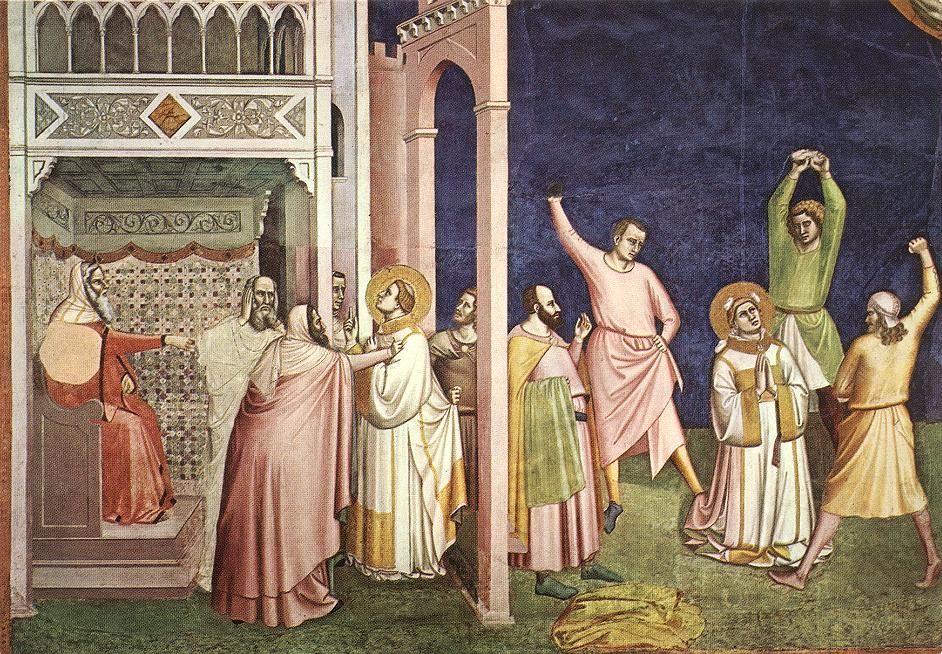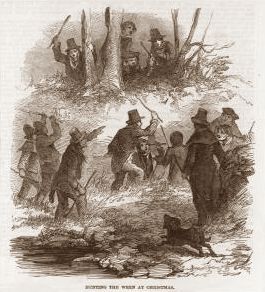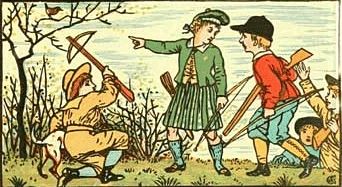One of the strangest, and cruellest, of the
Christmas customs was the Hunting of the Wren. The wren is one of our smallest
birds and is traditionally said to be the King of the Birds; the birds met
together and decided that the bird that could fly the highest would become
their King. The Eagle soared above all the rest but when he reached his limit
and began to tire, the Wren emerged from hiding in the Eagle’s tail feathers
and flew above him, declaring himself to be King and proving that brains are
superior to brute strength.
This tradition as the wren being called the King of
the Birds is common across all European languages. In Greek it is Βασιλίσκος
(little king), in Spanish reyzuelo (a diminutive of rey – king),
in Italian reatino, in Swedish kungs-fogel – King’s fowl, in
Danish fugle-konge - fowl king, in German zaun-könig –
hedge-king, in Dutch winter-koninkjc – little Winter-king, and in Welsh bren
– King. The bird was held in great reverence in all cultures and to harm the
wren invited the worst of bad luck.
“He that hurts Robin and the Wren,Will never prosper, boy or man.”
Given this enormous respect for the bird, it is
surprising that a tradition began in which the wren was hunted and killed at
Christmastide. There are numerous theories why the Hunt began; some say that it
related to the transgressions allowed during the reign of the King of Misrule
that are forbidden during the rest of the year. Others think that the early
Christian missionaries took exception to the reverence accorded the wren by the
Druids and commanded that it be hunted to spite their opponents and to
symbolise the ‘killing’ of their pagan practices.
 |
| B Daddi - The Martyrdom of St Stephen |
Another view is that the
first Christian martyr, St Stephen, was betrayed by the song of the wren, which
gave away his hiding place and the bird was hunted in revenge on his feast day,
December 26th. Yet another version is that St Stephen ‘took over’
the customs associated with the Norse god Freyr and the hunting is related to
Yule myths associated with him, with the murder of the King of the Birds
related to the killing of the year and the death of the Year King. We will
never know.
 |
| Hunting the Wren at Christmas |
But, usually on the morning of St Stephen’s Day, groups of men or
boys would seek out the wren and ultimately kill one, which would then be
carried in procession and buried with great ceremony. The wren would be stoned
to death, echoing the form of Stephen’s martyrdom, or killed with sticks or
even shot with firearms. In variations, the bird was taken alive, maimed and
fixed by the leg to two rings overlapping at right angles, on the end of a
pole, whilst boys sang,
“The wran, the wran, the King of all birds,St. Stephen's Day was caught in the furze:Come, give us a bumper, or give us a cake,Or give us a copper, for Charity's sake.”
 |
| Walter Crane - Hunting the Wren |
On the Isle of Man, a feather
from the wren was given in return for a donation, and this would bring luck for
the following year. In Scotland, the wren was hunted on New Year’s Day, caught
alive and decorated with ribbons before being released, in a custom called the
‘Deckan of the Wren’.
 |
| The Peasants Revolt 1381 |
An English folk-song, The Cutty Wren,
dating from at least 1776, relates the story of the hunting and dismemberment
of a wren, and some have associated this song to the Peasant’s Revolt of 1381,
with the wren being a symbol for King Richard II, but this is a very suspect
notion. Thankfully, Hunting the Wren has now died out, although the ceremony
remains in some locations, where a proxy, imitation bird is displayed instead,
amidst dancing, music and fancy costumes.


No comments:
Post a Comment